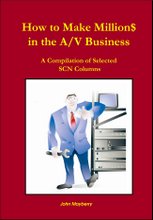Anyone following Carl Icahn's career knows he buys a 5% of an American company, strips out their cash, and then forces management to pay him off to get rid of him. Usually the company is destroyed in the process (see TWA). That business model is dead. Read on to see what happens when you don't invest in new product.
Icahn's Motorola Morass
Joan E. Lappin, Gramercy Capital 05.03.08, 11:37 AM ET
What if you held a party and nobody came? What if you held a sale and nobody bid? That is exactly the situation at Motorola.
About a year ago, Carl Icahn bought 3.6% of the company's stock, either directly or through long-term options, for about $18.36 per share, or almost twice its current price. He was unsuccessful in securing a board seat last April in his proxy battle against then incumbent management. He could have gotten out then with not much of a loss. The market gods were trying to tell him something, but he failed to hear the message.
Icahn sought to "monetize" the Motorola (nyse: MOT - news - people ) mobile device business and have representation on the board of directors. Over the last five quarters or 15 months, Motorola's handset share has fallen from a RAZR-driven peak at the end of 2006 of 66 million units and a 23% share to a recently reported low of 9.4%.
Nobody wants to pay money for this tarnished brand. Competitors are finding that they can just steal the share with more exciting new products than the brain-drained Motorola can muster to market. Just check the inserts in your Sunday paper and see which brands AT&T (nyse: T - news - people ) and Verizon (nyse: VZ - news - people ) are offering up these days. It's Samsung, LG, Apple (nasdaq: AAPL - news - people ) and BlackBerry from Research in Motion (nasdaq: RIMM - news - people ). Just about the only ads you'll see for Motorola these days are for a free phone or one at a bargain basement $29 price or a buy-one-get-one free deal.
About This Blog:
Integrating complex electronic projects requires industry individuals keep abreast of the latest technological trends.
Some things are important, many ironic, others outright frauds, and a few are just so very wrong. Occasionally the original technological goal and downstream results are in hilarious conflict.
Usually "the latest trends" go back fifty to one hundred years in their development and are only new to the uninformed. In most every case, the ancients have truly stolen our inventions!
As far as we know, this is the only place that collects them and lets you celebrate them for yourself. We'd love to hear from you if you have something we've missed!
Some things are important, many ironic, others outright frauds, and a few are just so very wrong. Occasionally the original technological goal and downstream results are in hilarious conflict.
Usually "the latest trends" go back fifty to one hundred years in their development and are only new to the uninformed. In most every case, the ancients have truly stolen our inventions!
As far as we know, this is the only place that collects them and lets you celebrate them for yourself. We'd love to hear from you if you have something we've missed!
Blog Archive
-
▼
2008
(332)
-
▼
May
(34)
- Kids Banned from Apple Store?
- WiFi Concerns in Santa Fe
- Billboards Looking Back At You Now
- Yawn- Vista Replacement Two Years Off
- Microsoft and NBC Caught
- Your AA Flight Reservation
- Nice Sound Masking System Package
- Virtual Magic Kingdom to Close
- Digital Savvy Consumers Presage Behaviors Across t...
- Were Newton and Einstein Wrong?
- Large Scale Touchpanels
- Slow Day Amusement
- MiniProjectors Are Coming!
- Microsoft Telescope Released to Public
- Apple Running out of Old iPhones
- Big Changes at NBC Owned and Operated Stations
- Worth Checking Out
- Stream from Your Home PC to your iPhone/iTouch
- Nice Primer on Acoustical Barriers
- Upcoming Southern California Theme Park Attractions
- FCC Frequency Spectrum Assignments
- Finally, the WiMAX race begins...
- Telecom Joke
- $35 Billion Mistake?
- CCTV Systems Not Working
- Lost Your Luggage Key?
- Powered Vertec
- AT&T delivers MediaFLO in 58 U.S. Markets
- Corporate Raider Gets Gonged (Finally!)
- RIAA Spanked in Court
- Blind Teenager Uses Echo Location
- Lose Money, Make Millions!
- Home Depot Retrenching
- They Are Their Own Customer
-
▼
May
(34)


